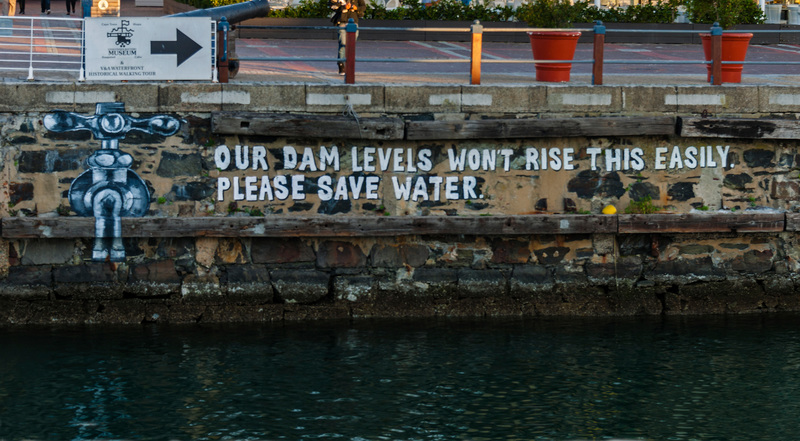‘Progressive’ new water strategy for Cape Town
18 February 2019 | Story Kevin Winter. Photo Daniel Case, Wikimedia. Read time 7 min.
As Cape Town prepares to transition to a water-sensitive city, the new water strategy – now open for public comment – appears to position ordinary citizens, already well acquainted with the narrative of “Day Zero”, as key to its success.
Also a critical focus is the issue of potential solutions to the city’s future water management, said Dr Kevin Winter, of the University of Cape Town’s (UCT) Future Water Institute.
The strategy, which is open for public comment until 15 March, is described by Winter as a “high-level master class in urban water management”, and a broad vision “for getting more water, cost of new water sources, tariffs and improving revenue collection, and a progressive approach to improving urban water management”.
A “progressive approach”, he said this will enable a transition to a water-sensitive city by improving institutional capability and public capacity through collaboration and trust, among many other things.
“The document, in its current form, appears to target citizens who are deeply acquainted with the narrative of ‘Day Zero’ and potential solutions to the future of water management in the city.”
Five commitments
The city is seeking public comment on the following five commitments for the future provision of water services and management of the urban water environment
- Safe access to water and sanitation for all residents, with well-defined minimum standards and an emphasis on building trust and increasing safety, especially in respect of residents of informal settlements.
- Wise use of water by ensuring cost recovery from investments in additional supplies; developing incentives to support water efficiency; supporting active citizenship; and managing the water network to reduce losses.
- Sufficient, reliable supply of water by drawing on a range different sources that will increase supplies by approximately 300 million litres per day over the next 10 years.
- Shared benefits from regional water to optimise economic, social and ecological benefits through collaboration with stakeholders and partners, including other urban areas, the agricultural sector and other spheres of government.
- A water-sensitive city that includes optimal use of stormwater and urban waterways for the purpose of flood control, aquifer recharge, water re-use and recreation, and which is based on sound ecological principles.
Accountability
Winter explained that a commitment, in the language of water governance, is an obligation to undertake actions that gives assurance of water supply, along with integrated, effective management of urban water.
While the strategy provides the first blueprint to hold the city accountable to its commitments, he said there is an important qualification.
“The city admits that it cannot manage the Herculean task of managing the provision of water services on its own – and rightly so.”
Winter said this is an important admission that some will consider a weakness, but which is instead likely to be key to the city’s success in building a progressive, forwarding-thinking water strategy.
“In the future, the implementation of commitments and actions will require a ‘whole of society’ approach in which there is city-wide collaboration built on trust, transparency and mutual accountability.
“In other words, the challenge should be more about social transformation than finding new water supplies, capital cost and operational expenses.”
The strategy doesn’t elaborate on additional resources required to ensure and maintain effective collaboration and trust, he added, but does signal a new direction in the development of public and private involvement in urban water management.
“A city that safeguards itself against water risks is characterised by shared accountability. We have a long way to go.”
Supply and cost
To be fair, said Winter, the water strategy is a broad vision informing and guiding forthcoming plans, hence the call for public comment to inform draft strategy and develop a more accessible document.
“The bottom line for many will be the cost and anticipation of extra water supplies to manage the threat of unreliable rainfall. Efforts to secure more water starts this year with an investment of nearly R1.5 billion in capital for an additional 187 Ml/day. Over 10 years the aim is achieve an additional 350 Ml/day of new water, that includes desalination, at a total cost of R5.4 billion.”
Have your say
The request for public comment focuses on a final category – translating the strategy into action.
Winter described the strategy document as “a dense read”, beginning with increasing capability, followed by financing capital costs and adjusting tariffs, and ending with monitoring implementation and reviewing the strategy.
“If you have survived the master class by this stage of the read, then you are capable of making a meaningful contribution to the public comment!” he suggested.
Winter is clear that the opportunity to comment on public documents must be gratefully acknowledged since it is an essential feature which is often ignored by local governments in South Africa.
But he questioned the type of public comment that will be helpful to the city, and whether the city will in fact have the capacity to interrogate thousands of comments elicited from the feedback.
“Let’s hope so. If the city is indeed serious about its claim that the strategy forms part of its transition from ‘a municipal engineering department to a modern professional water service provider’, then it should be delighted to be guided by public comment.
“However, it is difficult to comment on lofty ideals especially where it lacks detail. It might be best to focus on what is missing, for example, the strategy to improve collaboration between public-private and community partnerships; improving surface and ground water monitoring; managing surface water and coastal pollution; radical measures to implement safe access to sanitation; and how to achieve a water-sensitive city by 2040.”
The future we want
Winter pointed out that the city’s water crisis has helped in re-shaping practice in the future management of Cape Town’s water.
The world, he said, is still watching Cape Town and is keenly waiting to see how lessons are translated into action.
“The city avoided two crises this past year in water management. It successfully avoided Day Zero and avoided large-scale investment in new water supplies during the crisis. Both are significant.
“The proposed strategy signals a much more responsible approach to building a robust, long-term plan,” he said, urging people to participate in the public comment process.
- Read the full strategy.
- Submit your comments online, or at sub-council offices for written submissions.
 This work is licensed under a Creative Commons Attribution-NoDerivatives 4.0 International License.
This work is licensed under a Creative Commons Attribution-NoDerivatives 4.0 International License.
Please view the republishing articles page for more information.










